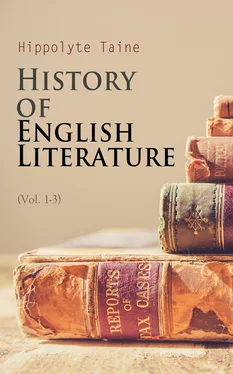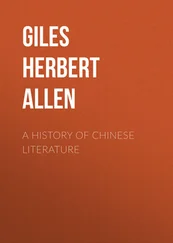[265]See, at Bruges, the pictures of Hemling (fifteenth century). No paintings enable us to understand so well the ecclesiastical piety of the Middle Ages, which was altogether like that of the Buddhists.
[266]The first carriage was in 1564. It caused much astonishment. Some said that it was "a great sea-shell brought from China"; others, "that it was a temple in which cannibals worshipped the devil."
[267]For a picture of this state of things, see Fenn's "Paston Letters."
[268]Louis XI in France, Ferdinand and Isabella in Spain, Henry VII in England. In Italy the feudal regime ended earlier, by the establishment of republics and principalities.
[269]1488, Act of Parliament on Enclosures.
[270]A "Compendious Examination," 1581, by William Strafford. Act of Parliament, 1541.
[271]Between 1377 and 1588 the increase was from two and a half to five millions.
[272]In 1585; Ludovic Guicciardini.
[273]Henry VIII at the beginning of his reign had but one ship of war. Elizabeth sent out one hundred and fifty against the Armada. In 1553 was founded a company to trade with Russia. In 1578 Drake circumnavigated the globe. In 1600 the East India Company was founded.
[274]Nathan Drake, "Shakespeare and his Times," 1817, I. V. 72 et passim.
[275]Nathan Drake, "Shakespeare and his Times," I. V. 102.
[276]This was called the Tudor style. Under James I, in the hands of Inigo Jones, it became entirely Italian, approaching the antique.
[277]Burton, "Anatomy of Melancholy," 12th ed. 1821. Stubbes, "Anatomie of Abuses," ed. Turnbull, 1836.
[278]Nathan Drake, "Shakespeare and his Times," II. 6, 87.
[279]Holinshed (1586), 1808, 6 vols. III. 763 et passim.
[280]Ibid., Reign of Henry VII "Elizabeth and James Progresses," by Nichols.
[281]Laneham's Entertainment at Killingworth Castle, 1575. Nichols's "Progresses," vol. I. London, 1788.
[282]Ben Jonson's works, ed. Gifford, 1816, 9 vols. "Masque of Hymen," vol. VII. 76.
[283]Certain private letters also describe the court of Elizabeth as a place where there was little piety or practice of religion, and where all enormities reigned in the highest degree.
[284]Nathan Drake, "Shakespeare and his Times," chap. V. and VI.
[285]Stubbes, "Anatomie of Abuses," p. 168 et passim.
[286]Hentzner's "Travels in England" (Bentley's translation). He thought that the figure carried about in the Harvest Home represented Ceres.
[287]Warton, vol. II. sec. 35. Before 1600 all the great poets were translated into English, and between 1550 and 1616 all the great historians of Greece and Rome. Lyly in 1500 first taught Greek in public.
[288]Ascham, "The Scholemaster" (1570), ed. Arber, 1870, first book, 78 et passim.
[289]Ma il vero e principal ornemento dell' animo in ciascuno penso io che siano le lettere, benche i Franchesi solamente conoscano la nobilita dell'arme... et tutti i litterati tengon per vilissimi huomini. Castiglione "Il Cortegiano," ed. 1585, p. 112.
[290]See Burchard (the Pope's Steward) account of the festival at which Lucretia Borgia was present. Letters of Aretinus, "Life of Cellini," etc.
[291]See his sketches at Oxford, and those of Fra Bartolomeo at Florence. See also the Martyrdom of St. Laurence, by Baccio Bandinelli.
[292]Benvenuto Cellini, "Principles of the Art of Design."
[293]"Life of Cellini." Compare also these exercises which Castiglione prescribes for a well-educated man, in his "Cortegiano," ed. 1585, p. 55: "Peró voglio che il nostro cortegiano sia perfetto cavaliere d'ogni sella.... Et perche degli Italiani è peculiar laude il cavalcare bene alia brida, il maneggiar con raggione massimamente cavalli aspri, il corre lance, il giostare, sia in questo de meglior Italiani.... Nel torneare, teper un passo, combattere una sbarra, sia buono tra il miglior francesi.... Nel giocare a canne, correr torri, lanciar haste e dardi, sia tra Spagnuoli eccelente.... Conveniente è ancor sapere saltare, e correre;... ancor nobile exercitio il gioco di palla.... Non di minor laude estimo il voltegiar a cavallo."
[294]Puttenham, "The Arte of English Poesie," ed. Arber, 1869, book I. ch. 31, p. 74.
[295]Surrey's "Poems," Pickering, 1831, p. 17.
[296]Ibid. "The faithful lover declareth his pains and his uncertain joys, and with only hope recomforteth his woful heart," p. 53.
[297]Ibid. "Description of Spring, wherein everything renews, save only the lover," p. 2.
[298]Ibid. p. 50.
[299]Syrrey's "Poems. A description of the restless state of the lover when absent from the mistress of his heart," p. 78
[300]In another piece, "Complaint on the Absence of her Lover being upon the Sea," he speaks in direct terms of his wife, almost as affectionately.
[301]Greene, Beaumont and Fletcher, Webster, Shakespeare, Ford, Otway, Richardson, De Foe, Fielding, Dickens, Thackeray, etc.
[302]"The Frailty and Hurtfulness of Beauty."
[303]"Description of Spring. A Vow to Love Faithfully."
[304]"Complaint of the Lover Disdarned."
[305]Surrey, ed. Nott.
[306]The Speaker's address to Charles II on his restoration. Compare it with the speech of M. de Fontanes under the Empire. In each case it was the close of a literary epoch. Read for illustration the speech before the University of Oxford, "Athenæ Oxonienses," I. 193.
[307]His second work, "Euphues and his England," appeared in 1581.
[308]See Shakespeare's young men, Mercutio especially.
[309]"The Maid her Metamorphosis."
[310]Two French novels of the age of Louis XIV, each in ten volumes, and written by Mademoiselle de Scudéry.—Tr.
[311]Celadon, a rustic lover in "Astrée," a French novel in five volumes, named after the heroine, and written by d'Urfé (d. 1625).—Tr.
[312]"Arcadia," ed. fol. 1629, p. 117.
[313]"Arcadia," ed. fol. 1629, p. 114.
[314]"The Defence of Poesie," ed. fol. 1629, p. 558: "I dare undertake, that Orlando Furioso, or honest King Arthur, will never displease a soldier: but the quidditie of Ens and prima materia, will hardly agree with a Corselet." See also, in the same book, the very lively and spirited personification of History and Philosophy, full of genuine talent.
[315]"The Defence of Poesie," ed. fol. 1629, p. 553.
[316]Ibid. p. 550.
[317]Ibid. p. 552.
[318]Ibid. p. 560. Here and there we find also verse as spirited as this: "Or Pindar's Apes, flaunt they in phrases fine, Enam'ling with pied flowers their thoughts of gold."—p. 568.
[319]"Astrophel and Stella," ed. fol. 1629, 101st sonnet, p. 613.
[320]Ibid. 8th song, p. 603.
[321]"Astrophel and Stella" (1629), 8th song, 604.
[322]Ibid. 10th song, p. 610.
[323]Ibid, sonnet 69, p. 555.
[324]"Astrophel and Stella" (1629), sonnet 102, p. 614.
[325]Ibid. p. 525: this sonnet is headed E. D. Wood, in his "Athen. Oxon." i., says it was written by Sir Edward Dyer, Chancellor of the Most noble Order of the Garter.—Tr.
Читать дальше












